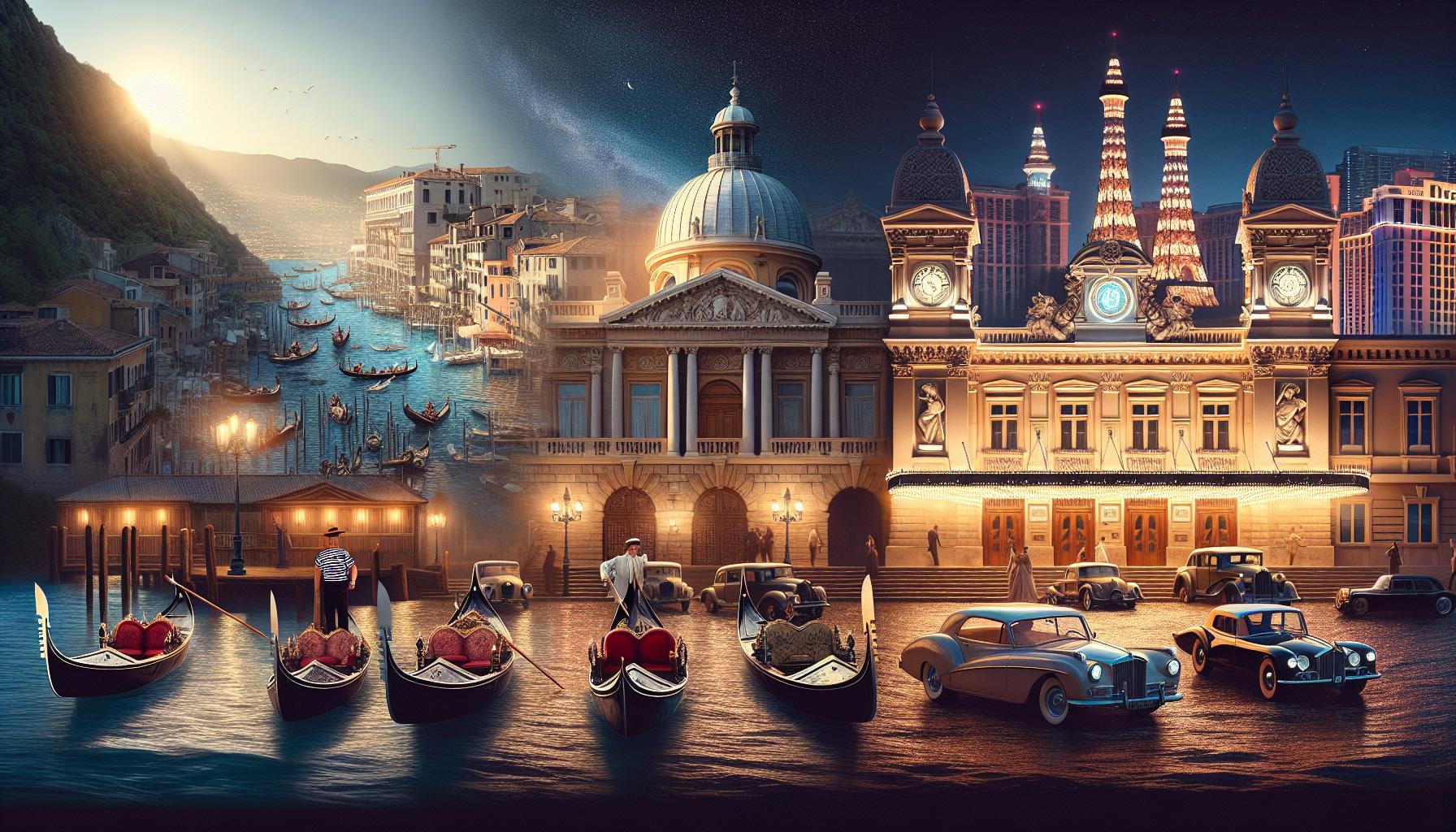Have you ever wondered how casinos came to be? The origins of casinos can be traced back centuries, with a rich history that has evolved over time. From ancient civilizations to modern-day entertainment hubs, the concept of gambling and wagering has always captivated people’s interest.
Throughout history, casinos have played a significant role in various cultures and societies. The evolution of casinos has been shaped by a combination of factors, including social, economic, and political influences. Understanding the beginnings of casinos provides valuable insights into the development of this thriving industry.
In this article, we will delve into the fascinating history of how casinos started and explore the key milestones that have shaped the world of gambling as we know it today. Get ready to embark on a journey through time to uncover the origins of casinos and the impact they have had on society.
Table of Contents
ToggleAncient Origins of Gambling
Gambling has ancient origins, dating back thousands of years. In various ancient civilizations, gambling was a common activity, reflecting a basic human desire for chance and risk. Some key points to consider about the ancient origins of gambling include:
- Mesopotamia: One of the earliest records of gambling can be traced back to Mesopotamia, where six-sided dice dating around 3000 BC were used for betting.
- China: Gambling in ancient China was popular, with games like Keno originating there. It eventually spread to other regions and influenced modern casino games.
- Ancient Greece and Rome: Gambling was prevalent in these civilizations, with games like dice and betting on sports events being common activities.
- Indigenous Cultures: Many indigenous cultures around the world had their own variations of gambling, often tied to spiritual beliefs and practices.
- Cross-cultural Influences: Trading and exploration led to the exchange of gambling practices between different regions, contributing to the diversity of betting activities.
The historical roots of gambling run deep, reflecting the human fascination with luck, skill, and entertainment across diverse civilizations and time periods.
Early Forms of Wagering

In the earliest times, gambling activities were simple and primal. People would gather to wager on events like animal fights, races, or personal duels. It was a way to add excitement to daily life and create a sense of community through shared risk-taking.
The concept of wagering soon evolved with the introduction of primitive games of chance. Dice, cards, and simple board games emerged as popular methods for betting on luck. These early forms of wagering laid the foundation for the sophisticated casino games we know today.
As civilizations expanded and interacted, gambling practices traveled across regions, blending with local customs and influences. This cultural exchange paved the way for the diverse casino landscape we see now, with varied games and betting options.
The **casino industry has a rich history rooted in human fascination with chance and risk. From early forms of wagering to modern casino culture, the allure of gambling venues has endured through the ages, offering entertainment and thrills to players worldwide.
The sounds of “ding ding ding” and the buzz of casino atmosphere continue to echo through gaming venues, embodying the excitement and energy of the casino experience.
| Important Facts | Data |
|---|---|
| Oldest forms of gambling | Started with basic wagering on events |
| Evolution of gambling | From animal fights to dice and card games |
| Role of cultural exchange | Shaped diverse casino landscape |
| Enduring appeal of casinos | Rooted in human desire for chance and risk |
Development of Modern Casinos
In the modern era, casinos have evolved into sophisticated gaming venues that offer a wide range of entertainment options.
- Casino slot machines have become a staple, with their distinctive ding ding ding sounds creating an atmosphere of excitement.
- The casino culture embraces innovation, with gaming experiences constantly evolving to meet the demands of players.
The casino industry continues to thrive, attracting patrons with a blend of thrills and chances for fortune.
| Facts and Figures |
|---|
| Global casino market value: $227 billion |
| Annual casino industry revenue: $125 billion |
| Number of casinos worldwide: 8,000+ |
As you explore modern casinos, you’ll encounter a blend of tradition and innovation that captivates visitors from around the globe.
Influence of Social and Economic Factors
When exploring the origins of casinos, it’s crucial to consider the influence of social and economic factors.
- Social Factors:
- Historical Context: Casinos can be traced back to ancient civilizations where gambling was a part of social gatherings.
- Entertainment Evolution: Over time, casinos evolved from small gambling establishments to full-fledged entertainment hubs.
- Cultural Significance: Casinos often reflect the cultural values and norms of the societies they are situated in.
- Economic Factors:
- Revenue Generation: Casinos have become economic powerhouses, contributing significantly to local and global economies.
- Employment Opportunities: The casino industry provides jobs for a wide range of individuals, boosting employment rates in various regions.
- Tourism Boost: Casinos attract tourists, stimulating local economies through increased spending on accommodations, dining, and other activities.
The interplay between these social and economic factors has been instrumental in shaping the development of casinos and their role in society.
Key Milestones in Casino Evolution
As you delve into the history of how casinos started, understanding key milestones becomes crucial. The evolution of casinos has been marked by significant developments that have shaped the industry and its cultural impact. Here are some essential milestones to consider:
- 17th Century: The first known casino, the Ridotto, opened in Venice, Italy, in 1638, setting the stage for organized gambling establishments.
- 19th Century: The development of modern casinos gained momentum in Europe and the United States, with iconic venues like the Casino de Monte-Carlo in Monaco becoming symbols of luxury and entertainment.
- 20th Century: Las Vegas emerged as a casino powerhouse in the mid-20th century, with legalized gambling paving the way for the construction of iconic resorts and casino complexes.
- Online Era: The rise of online casino gaming in the late 20th and early 21st centuries revolutionized the industry, making casino games accessible to a global audience 24/7.
These milestones not only illustrate the historical progression of casinos but also highlight their evolving role in society and entertainment culture. By tracing these key moments, you can gain a deeper appreciation for the casino industry’s rich history and ongoing transformation.
Conclusion
You’ve now explored the fascinating journey of how casinos came to be, from the humble beginnings of the Ridotto in Venice to the glitz and glamour of Las Vegas and the global reach of online casinos. Each milestone represents a significant chapter in the industry’s history, reflecting its cultural impact and evolution over the centuries. By understanding the historical context and societal significance of casinos, you gain a deeper appreciation for their role in shaping entertainment culture. As the industry continues to innovate and adapt to changing times, it remains a dynamic force in the world of gaming and leisure.
Frequently Asked Questions
What was the first known casino in history?
The first known casino in history was the Ridotto, opened in Venice in 1638.
Which iconic venue is known for its significant role in the evolution of casinos in the 19th century?
The Casino de Monte-Carlo is an iconic venue known for its significant role in the evolution of casinos in the 19th century.
What city emerged as a powerhouse for casinos in the 20th century?
Las Vegas emerged as a powerhouse for casinos in the 20th century.
How has the online era impacted the casino industry?
The online era has revolutionized the casino industry, making casino games accessible globally.
What do these milestones in the evolution of casinos emphasize?
These milestones emphasize the historical progression of casinos and their evolving role in society and entertainment culture.





















